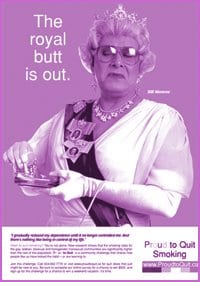A series of new and colourful ads have redecorated Davie St in the last few weeks, and the man behind them is hoping that they will fundamentally change the way Vancouver gays and lesbians live their lives.
The Proud to Quit anti-smoking campaign is spearheaded by campaign manager Steven RodRozen and project creator Steve McManus of Gay West. Their goal: to dramatically reduce smoking rates in the gay community, which a recent study found to be 10 percent higher than the Canadian national average.
RodRozen points to a 2000 survey by Vancouver’s Community Based Research Group, which shows 29 percent of gays and lesbians light up on a regular basis. In the general population of Canada, that number drops to 19 percent.
“You can see why Health Canada jumped on this-it’s extremely alarming,” RodRozen says.
The ads, now adorning billboards and bus shelters all over the city, as well as the pages of this paper, feature well-known members of Vancouver’s gay community talking about their own personal battles with smoking.
“We chose positive, colourful imagery and stayed away from scare tactics,” says RodRozen. “It’s all about getting people’s attention, creating awareness, providing resources and hopefully reducing the tobacco prevalence rate.”
Health Canada pledged a whopping $350,000 to the Proud to Quit campaign. This is in stark contrast to its miserly record on supporting gay health initiatives in the past. Its funding for the Canadian AIDS Strategy, for example, was frozen for 11 years until a token increase last May.
Phillip Banks, coordinator of Gayway, is cautiously optimistic but warns that a continued commitment to gay men’s health issues might not be in the offing.
“What I hear is that in some parts of Health Canada there is willingness and even a growing interest in doing specifically LGBT and gay men’s focused campaigns,” Banks says. “At the same time, there also seems to be a shift away from that.”
The Proud to Quit campaign is promising, he continues, but “my sense is that there is an internal struggle there, and I don’t know who is going to win.”
Securing the money for the Proud to Quit campaign was a remarkably easy ordeal. RodRozen simply applied for the money and got it.
He says he’s not surprised Health Canada agreed to fund an anti-smoking campaign-even a gay one. The government seems desperate to reduce smoking rates in Canada, he notes.
The Proud to Quit campaign is the first ever anti-smoking effort aimed specifically at a gay community in Canada. Stereotypes of gay men that smoke are as prevalent as the waiter myth (Buddy Cole, anyone?) but hard, scientific data has been almost non-existent until very recently.
“Anecdotally, there is a lot of smoking going on in the gay community,” says Banks. “I think there are a lot of reasons to smoke: issues that create vulnerability to smoking, like stress; smoking as a coping mechanism, facing homophobia and heterosexism and violence; family dynamics where people feel unwelcome in their own families. Those kinds of things can contribute to engaging in behaviors that are not super-healthy.”
The idea of a government funded anti-smoking campaign is nothing new. Studies have shown that tobacco-related illnesses are a massive drain on Health Canada’s coffers. But a campaign aimed directly at one city’s gay and lesbian community is unprecedented and could make a huge difference as to how the message is received.
“I think any tobacco reduction campaign is important, and actually targeting the gay community is highly important given the alarmingly high rates that are in the community,” RodRozen says.
“Obviously, there are reasons within the community that lead to this challenge that we have,” he continues. “And yes, I think that if the advertising speaks to the gay and lesbian community, it will have a greater effect than if it were aimed at the general population.”
“A campaign targeting the mainstream and expecting gay men to see themselves in that campaign is unrealistic,” Banks agrees. “The more relevant the information seems to me, the more I’m going to pay attention to it. So as a gay man, seeing that smoking is an issue for gay men-not just men-it’s going to get my attention more.”
The Proud to Quit campaign is designed to be both educational and interactive. A survey on the campaign’s website will help measure smoking trends in Vancouver’s gay community.
Then there’s the Community Challenge. “We are going to be working with community organizations, using their publications, their networks, their newsletters and partnering with them,” RodRozen explains. “At the end of the year, we’re going to raffle a $5,000 advertising prize among all the people that came aboard, and that’s going to be an incentive.” The winner will get free ad space in Xtra West.
In the end, this campaign won’t be measured in government dollars spent or advertising dollars given away, but in lives. A proven success here could easily lead to similar campaigns popping up in other Canadian cities.
“There is a major research component here. I think it will be much easier for other gay communities throughout Canada to apply and receive funding,” RodRozen suggests. “This study is that important-and all of Canada is watching.”
PROUD TO QUIT.
www.proudtoquit.ca

 Why you can trust Xtra
Why you can trust Xtra


